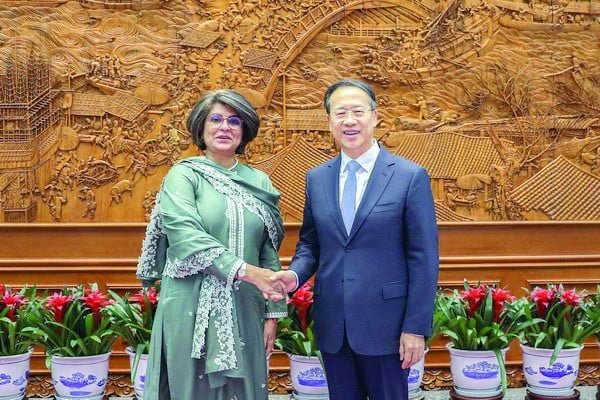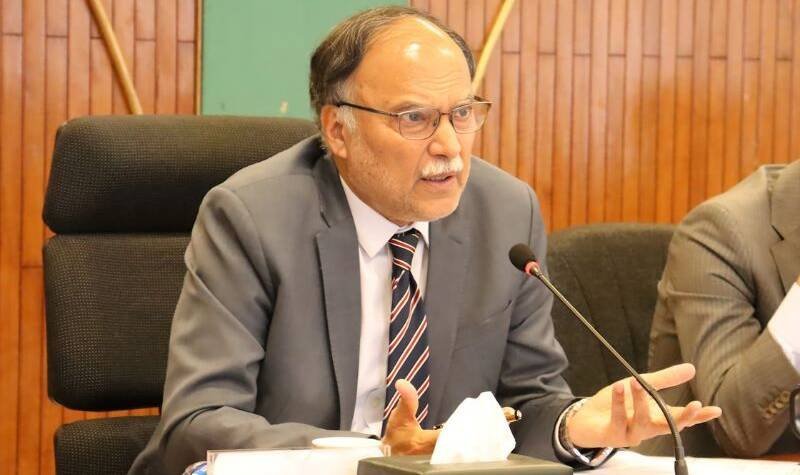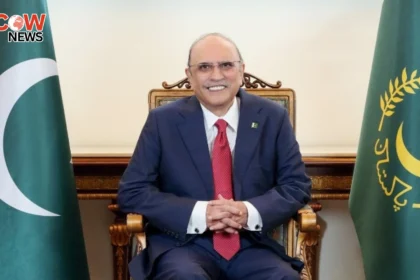Zarshad Khan
Pakistan and China Strengthen Friendship with CPEC Progress
The friendship between Pakistan and China is stronger than the Himalayas, with China consistently supporting Pakistan in times of difficulty. China initiated the China-Pakistan Economic Corridor (CPEC) project to support Pakistan’s development, which will open employment opportunities for the people of Pakistan. China is investing in Pakistan to strengthen its economy, and numerous significant agreements are currently being worked on between the two nations. With Chinese investment, Pakistan is progressing rapidly. Both governments are committed to working together in this regard. In this context, the fifth international cooperation meeting of the CPEC Joint Working Group was held recently in Beijing, where satisfaction was expressed regarding the progress of various projects, and a commitment was made to further promote regional development, partnerships, and economic prosperity under CPEC.

Currently, several key agreements and projects are under development between Pakistan and China. These initiatives, driven by Chinese investments, are accelerating Pakistan’s economic progress. Both governments are committed to working together to achieve shared objectives, with CPEC playing a pivotal role in this vision. Recently, an important meeting of the CPEC Joint Working Group was held, highlighting the advancements made and reaffirming the commitment to promoting regional development, partnerships, and economic prosperity under CPEC.
The meeting, which took place in Beijing, was attended by Amina Baloch, Pakistan’s Foreign Secretary, and Sun Weidong, the Deputy Foreign Minister of China. The meeting’s main focus was to review the progress made since the fourth meeting held in Islamabad the previous year. The session emphasized the importance of industrial development, special economic zones (SEZs), clean energy, agriculture, and public welfare projects. Foreign Secretary Amina Baloch emphasized that CPEC is a cornerstone of Pakistan-China economic cooperation and a symbol of their longstanding friendship. Sun Weidong highlighted the alignment of the five new corridors introduced under CPEC with Pakistan’s national development framework.
The meeting also focused on boosting media, cultural exchanges, and people-to-people connections to strengthen the shared future between Pakistan and China. These efforts are aimed at accelerating the creation of a community of shared destiny between the two nations.
Before the meeting, Pakistan’s Finance Minister, Muhammad Aurangzeb, shared that Pakistan is eager to raise $200 to $250 million from Chinese investors. He stressed that Chinese investments are critical for Pakistan’s economic stability. Minister Aurangzeb expressed that Pakistan is seeking further cooperation with China in the next phase of CPEC, particularly in expanding special economic zones, agriculture, and the information technology sector. Additionally, he highlighted plans to align Pakistan’s market with China’s capital markets, including the issuance of Panda bonds by June. The finance minister also revealed that Pakistan is in discussions with the Asian Infrastructure Investment Bank (AIIB) for bank guarantees related to the issuance of Yuan bonds, following Egypt’s model. Furthermore, Pakistan aims to improve its credit rating to a single ‘B’ rating in the coming months.

Minister Aurangzeb reiterated the importance of Chinese investment for Pakistan’s economic recovery, noting that the next phase of CPEC will focus on expanding SEZs and promoting the agriculture and IT sectors. He also called on China’s private sector and export industries to invest in Pakistan, emphasizing that Chinese companies could relocate their export units to Pakistan and use it as an export hub. The development of export industries will also help Pakistan ease its debt repayment challenges.
The finance minister also pointed out that Pakistan’s economy, which heavily relies on imports, is facing a shortage of foreign exchange and imbalances in payments. However, he assured that the security situation in Pakistan has improved, and steps will be taken to enhance the protection of Chinese companies operating in the country. With global conferences being held and foreign delegations visiting Pakistan, the investment environment is becoming increasingly favorable.
On the other hand, Federal Minister for Planning, Development, and Special Initiatives, Ahsan Iqbal, chaired a high-level meeting in Islamabad to discuss the activation of the Gwadar Port. Senior officials from various departments, including the Planning Commission, Ministry of Foreign Affairs, Ministry of Communications, Ministry of Maritime Affairs, Ministry of Railways, and Ministry of Petroleum, participated in the meeting. Diplomats from embassies also joined the discussion through video links.
During the meeting, Minister ahsan Iqbal highlighted the strategic importance of the Gwadar Port, describing it as one of Pakistan’s most valuable assets. He emphasized that Gwadar provides the shortest trade route for countries in the Gulf and Central Asia, including Turkmenistan, Tajikistan, and Kyrgyzstan. The port holds tremendous potential to become a vital regional transshipment hub. However, Iqbal expressed concern over the lack of a comprehensive trade analysis and operational plan for Gwadar Port and called for immediate action to fully utilize its capacity.

Minister Iqbal directed the creation of a robust action plan within the next six months to generate commercial traffic through the port. This plan aims to unlock the full economic potential of Gwadar, ensuring that it serves as a central hub for trade and business in the region.
The discussions around CPEC and Gwadar Port are significant milestones in Pakistan’s development, reinforcing the economic ties between Pakistan and China. With CPEC’s continued expansion, Pakistan is poised to benefit from an influx of investments, infrastructure development, and enhanced connectivity with global markets.
Future Prospects for Pakistan-China Relations
Pakistan’s economic trajectory is closely linked to its strategic partnership with China. As both countries continue to deepen their cooperation, the impact of CPEC on Pakistan’s infrastructure, energy sector, and economy is becoming more evident. The expansion of special economic zones, improvements in agricultural practices, and the promotion of clean energy are expected to contribute significantly to Pakistan’s development goals. Moreover, efforts to enhance people-to-people exchanges and strengthen cultural ties will further solidify the bond between the two nations.
China’s support for Pakistan during challenging economic times is invaluable. Through investments and collaboration on projects like CPEC, China is playing a key role in helping Pakistan unlock its full potential. As both countries look to the future, there is a shared commitment to working together for regional stability, prosperity, and mutual success.
The commitment to strengthening Pakistan’s economic position and regional development is evident in the ongoing discussions and strategic agreements between the two nations. The next phase of CPEC will undoubtedly play a central role in shaping Pakistan’s economic future, offering new opportunities for growth.
Pakistan’s aspirations for a stronger economy are deeply intertwined with its partnership with China, and with both countries dedicated to furthering their collaboration, the future of their relationship looks promising. As CPEC continues to evolve, it will serve as a model of international cooperation, paving the way for a more prosperous and connected future for both Pakistan and China.







